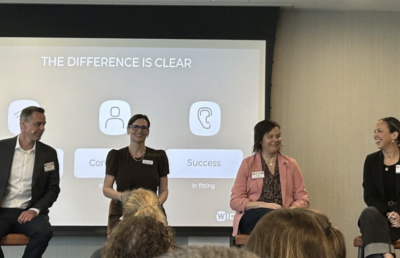Hearing loss has been decidedly linked to developmental delays in children. Because children usually aren’t aware enough to notice the hearing loss and alert their parents, parents need to be vigilant for some of the classic signs of hearing loss in their children and test them as soon as they notice something might be off.
Hearing loss can really have a major impact on the entire life of a child. First of all, hearing loss leads to delayed language and expression. This, in turn, almost universally leads to lower academic achievement. Lower communication skills also lead to social isolation. The combination of low academic and social achievement usually leads to poorer career choices, and this could determine the trajectory of a person’s life even if the hearing loss is eventually discovered and treated.
There are a number of deleterious effects to hearing loss, according to ASHA. Here are just a few of them:
Vocabulary Problems
- Vocabulary develops more slowly in children who have a hearing loss.
- Children with a hearing loss learn concrete words like cat, jump, five, and red more easily than abstract words like before, after, equal to, and jealous. They also have difficulty with function words like the, an, are, and a.
- The gap in vocabulary between children with normal hearing and those with a hearing loss widens with age. Children with a hearing loss do not catch up without intervention.
- Children with a hearing loss have difficulty understanding words with multiple meanings. For example, the word bank can mean the edge of a stream or a place where we put money.
- Children with a hearing loss understand and create shorter and simpler sentences than children with normal hearing.
Poor Sentence Structure
- Children with a hearing loss often have difficulty understanding and writing complex sentences, such as those with relative clauses (“The teacher, whom I have for math, was sick today”) or in the passive voice (“The ball was thrown by Mary”).
- Children with a hearing loss often cannot hear word endings such as -s or -ed. This leads to misunderstandings and misuse of verb tense, pluralization, and possessives, as well as non-agreement of subjects and verbs.
- Children with hearing loss have more simple sentence structure and are not as complex
Difficulties with Speech
- Children with a hearing loss often cannot hear quiet speech sounds such as “s,” “sh,” “f,” “t,” and “k” and therefore do not include them in their speech. Thus, speech may be difficult to understand. As the hearing loss severity increases, speech intelligibility decreases.
- Children with a hearing loss may not hear their own voice when they speak. They may speak too loudly or not loud enough. They may have a speaking pitch that is too high. They may sound like they are mumbling because of poor stress, poor inflection, or poor rate of speaking.
Lower Academic Achievement
- Children with a hearing loss have difficulty with all areas of academic achievement, especially reading and mathematical skills.
- Children with mild to moderate hearing loss, achieve one to four grade levels lower, on average, than
- their peers with normal hearing, unless appropriate management occurs.
- Children with a severe to profound hearing loss usually achieve skills no higher than the third- or fourth-grade level, unless appropriate educational intervention occurs early.
- The difference in academic achievement between children with normal hearing and those with a hearing loss usually widens as they progress through school.
- The level of achievement is related to parental involvement and the quantity, quality, and timing of the support services children receive.
Difficulties with Social Functioning
Children with a hearing loss often report feeling alone, without friends, and unhappy in school, particularly when their socialization with other children with a hearing loss is limited.
With this laundry list of potential issues, parents should really play it safe and bring their children in for a hearing test if they have even an inkling that there might be hearing loss. Early detection and intervention can negate some of these hearing loss issues. Don’t wait, schedule an appointment with us now!





